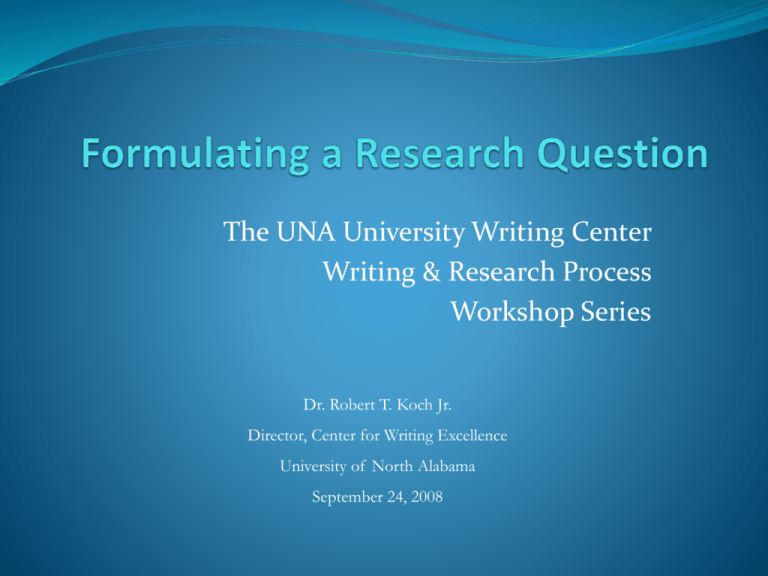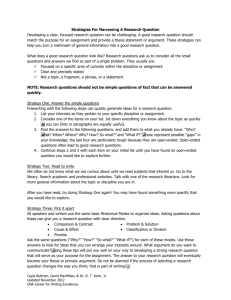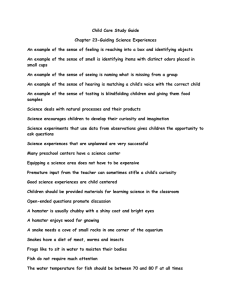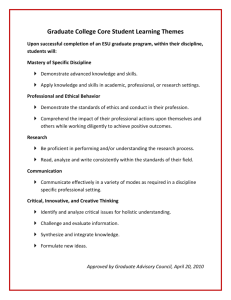
The UNA University Writing Center
Writing & Research Process
Workshop Series
Dr. Robert T. Koch Jr.
Director, Center for Writing Excellence
University of North Alabama
September 24, 2008
●Understand why we develop academic
research questions.
●Consider strategies for developing
research questions.
●Begin formulating our own research
questions.
● Curiosity is “the desire to learn or know about anything;
inquisitiveness” (Dictionary.com)
●Research is “diligent and systematic inquiry or investigation into a
subject in order to discover or revise facts, theories, applications,
etc.” (Dictionary.com)
● Considered together, curiosity is the source of our questions – we
ask because we want to know; research is the means by which we
find an answer.
● In academic work, we formulate clear questions to guide us in our
search for answers.
● Something you want to know about your discipline, or
about a specific area within your discipline.
●Not a topic, fragment, phrase, or sentence. It ends with a
question mark!
● Clear and precisely stated. It is not too broad, nor is it too
narrow.
●Open-ended, as opposed to closed. It cannot be answered
in a sentence or phrase.
●List your interests as they pertain to your specific discipline or
assignment.
●Consider one of the items on your list. Jot down everything you
know about the topic as quickly as you can (list or paragraph form is
fine).
● Now find the answers to the following questions in your freewrite,
or add the answers to your freewrite: “Who? What? When ? Where?
Why? How? So what?” and “What if…?”
●These represent possible “gaps” in your knowledge; the last four are
particularly tough because they are open-ended – they often lead to
good research questions .
●Continue steps 2 and 3 with each item on your initial list until you
have found an open-ended question you would like to answer.
●READ
●Often times, we don’t know what we are
curious about until we read about subjects that
interest us first. Go to the library, and also
search online academic and professional sites
related to your discipline and topic.
●After you have read, try doing
strategy #1 again!
●Consider the Rhetorical Modes which we all use
to organize our ideas in speaking or writing.
●Comparison & Contrast
●Process
●Classification or Division
●Cause & Effect
●Problem & Solution
●Consider “Why? How? So what?” and “What
if…?” for each of these modes.
●Focusing Question -- The most important question you
discovered from the three prior activities.
●Supporting Questions -- Questions that will help you
explore the relationships around the focusing question in
greater depth.
●Example
●Focusing Question: How can the university community
increase its economic impact on the Florence-Muscle Shoals
community?
●Supporting Questions: How does the university currently
impact the community economically? What could be done
that isn’t being done, and why? What are the limitations?
● Make your question one that somebody else will want an
answer to as well. They will be your AUDIENCE.
●Your PURPOSE is your reason for asking your question.
The answer to your research question will be a complete
statement expressed as a sentence – your THESIS.
● If you used a Rhetorical Mode to formulate your question,
you should use that mode to ORGANIZE THE
PARAGRAPHS of your paper (though you may certainly use
other modes as you DEVELOP your ideas!)
● Most importantly, do not get discouraged or worried if
you find your thesis or your beliefs changing – this is a
natural part of the researching and writing processes!
Ballenger, B. (2007). The curious researcher: A
guide to writing research papers (5th ed.). New
York: Pearson Longman.
Harris, M. (2006). The Prentice Hall reference
guide (6th ed.). New York: Pearson Longman.
Lester, J. D. & Lester Jr., J. D. (2002). Writing
research papers: A complete guide (10th ed.). New
York: Longman.








